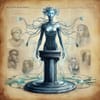The concept of artificial intelligence (AI) has its roots in ancient mythology, dating back over 2,500 years. In Greek myths, we find stories of automatons like Talos, a bronze giant with a 'divine fluid' power source, and Pandora, who may have been an AI agent in its original version. Hephaestus, the god of crafts and metalworking, created a set of automated servants out of gold and bestowed them with the knowledge of the gods.
These ancient stories reflect humanity's long-standing fascination with replicating human intelligence, emotions, and knowledge via inanimate objects. The myths asked questions that still resonate today in AI development, such as what it means to build something that thinks and whether human curiosity can replicate emotions or divinity.
Fast-forwarding to the modern era, AI has evolved significantly. From Alan Turing's Turing Test to the development of sophisticated machine learning algorithms, AI has come a long way. Today, AI systems like ChatGPT, Gemini, and Sora can generate art, protect and replicate voices, and make decisions, echoing the creative impulse found in ancient Greek mythology.
Understanding the history of AI helps us appreciate its evolution and potential future developments. The concept of AI has undergone significant transformations, from mythological automatons to sophisticated machine learning algorithms. As we continue to develop and refine AI, it's essential to consider the questions and themes that have been present in human imagination for centuries.


